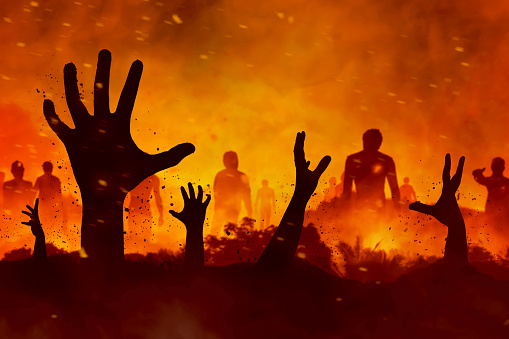Eternal Conscious Torment
The traditional form of hell is consigned with this title because it is the long-standing, traditional belief that eternal conscious torment (ECT) occurs in literal space and time, in a literal place called hell. It is also referred to on occasion as the “historical view.” Essentially, it is a destination where non-Christians end up after death to be tormented for eternity in flames of fire as punishment for not accepting the grace of Jesus Christ as personal savior. Therefore, those who do not believe in Jesus will be cast into the eternal fire punitively with no opportunity at redemption or a second chance at salvation.
The only way to escape hell is to become a Christian and believe Jesus died for your sins. There is no other option. In fact, several renowned pastors, like Francis Chan and David Platt, even believe those who have never even heard of Jesus will still be subjected to ECT in hell. Though not a “mainstream” viewpoint, it is becoming more common, usually amongst the more reformed Christians.
Literal Interpretation
Views like that come from a literal interpretation of many passages in the Bible that speak of final judgment. Many naturally raise the question then, “Is the persistent reference of fire concerning judgment indicative of a literal and eternal conscious torment?” One prominent theologian states, “The frequent mention of fire in connection with eternal punishment supports the conclusion that this is what the Scriptures mean.” There is no doubt that Scripture repeatedly mentions the word “fire” in reference to eternal punishment. Therefore, how do we interpret these passages that mention fire since they are primarily found in parables and apocalyptic writings?
For example, Matthew, who portrays Jesus as an apocalyptic preacher, states, “Then he will say to those on his left, ‘Depart from me, you who are cursed, into the eternal fire prepared for the devil and his angels” (Matt. 25:41). This is from the famous parable called “The Sheep and the Goats,” where Christ separates the wicked from the righteous. The wicked go into the eternal fire and the righteous into eternal life. Understandably, to get the traditional view of hell, one must observe this parable in a fundamentally literal manner and see Christ sending the wicked into flames for eternity.
Biblical Support of Hell
Though Jesus does not use the traditional word translated as hell in this passage (Gehenna) he does mention eternity in fire. The Traditional doctrine relies more on words associated with hell, rather than solely on the specific words translated as hell. Traditionalists rely on words and phrases such as, “eternal punishment,” “everlasting contempt,” “unquenchable fire,” “damnation,” “blackest darkness,” and the “lake of fire,” to just name a few, as the foundation of their doctrine. Still, many who hold to this view understand these references to be an overwhelming volume of evidence for the validity of a literal hell where individuals are in torment forever.

Similarly, the other primary prooftext traditionalists use is Revelation 20:14-15 which states, “Then Death and Hades were thrown into the lake of fire. The lake of fire is the second death. Anyone whose name was not found written in the book of life was thrown into the lake of fire.” This passage comes after 20:10 which states that the devil and the false prophet were already cast into the lake of fire, and now Death and Hades are there. Consequently, wicked individuals will be cast into the same place as the devil and the false prophet. Pair that verse with the verse quoted above from Matthew that the eternal fire is prepared for the devil and his angels, and you essentially have an orthodox view of what the traditional idea of hell is like.
Hell and Inerrancy
The traditional belief in hell likewise appears to be a litmus test from some traditionalists used against many other Christians concerning their interpretations of Scripture. Those who deny the traditional concept of hell can sometimes be accused of “picking and choosing what to believe” regarding biblical doctrines. That is because many feel the Bible is abundantly clear on this matter and, therefore, anyone who believes otherwise almost certainly does not hold the Bible as their “authority.” In the book Four Views on Hell (which is found HERE), theologian John Walvoord consistently links belief in biblical inerrancy with the traditional doctrine of hell as if the two are inextricably related to each other.
For example, Walvoord states, “Those who deny scriptural inerrancy naturally have no problem in supporting the idea that eternal punishment does not exist.” Later in the chapter, he asks if the Bible “Exegetically teaches eternal punishment, and, if so, whether the Bible should be believed.” Here, he is connecting non-belief in eternal punishment to non-belief in the Bible in its entirety. Finally, to emphasize this association, he writes, “If exegesis is the final factor, eternal punishment is the only proper conclusion; taken at face value, the Bible teaches eternal punishment. This observation is supported by the fact that many who reject eternal punishment also reject the inerrancy and accuracy of the Bible and even reject the teachings of Jesus.”
Is the Bible Clear on Hell?
Denying the traditional belief in Hell, according to Walvoord, denies the teachings of Jesus. If one were to hold to inerrancy and accuracy of Scripture, they must adhere to eternal conscious torment in Walvoord’s opinion. To many of the traditionalists who adhere to ECT and believe that is what the Bible clearly teaches, rejecting the reality of hell is to equally reject the authority of Scripture because the plain reading of the text directs one to eternal torment.

Obviously, many do not embrace ECT but still embrace Biblical inerrancy. However, many also believe that these two are reliant upon each other and that the denial of one will seemingly lead to a denial of the other. Therefore, some traditionalists feel the need to adhere to the traditional doctrine of hell because they do not want to deny the authority of Scripture.
Pros and Cons of Eternal Torment
Though much of church and theological tradition may be on the side of the eternal torment view (however, it is far from conclusive that it has been church tradition for 2000 years. I will have a huge post about this soon), there are many more questions than answers about this challenging doctrine. The most common objection being, “Does eternal conscious torment fit with God’s character?” Although many are used to hearing this objection and get somewhat frustrated when opponents of this view constantly bring it up, it nonetheless needs attention and critical thinking applied to it to rectify the two seemingly conflicting beliefs.
On the one hand, God is a God of love, grace, and mercy. Christ died to save all from their sins so they would not be held accountable on judgment day. Many Scriptural writers agree with this viewpoint. So, if this is the view of God’s character, is ECT appropriate within this context? Most traditionalists will insist that it does because God is righteous and must punish sin.
Must God Punish Sin?
This brings me to the second question regarding eternal torment… “Why must God punish sin if he is righteous and forgiving? Can He not just forgive and move on?” This question wonders why an ultimately forgiving God could not just forgive and why he absolutely must punish sins. Not only must he punish the sins, but he is punishing the people who sin with an eternity of torture. It piggybacks off the first question regarding God’s character and wonders why eternal torture is the only logical answer to this question. There is no other option except eternal torment?
The third question is, “Why must God punish finite sins with infinite punishment?” If our sins are only a short time in eternity, why must 70+ years of sin be punished for eternity? This objection to the traditional doctrine of hell raises the question of fairness. Most traditionalists will say that God is a “just and fair God,” but this punishment does not seem to be fair. It appears overly abusive and outright evil to those who oppose this view. Though many will claim “any sin against an infinite God, deserves infinite punishment.” That is a topic for a future blog post for sure.
Why Hell?
Lastly, why create hell to begin with? At first, this appears like an easy answer—it was initially prepared for the devil and his angels. However, God had no idea humans would end up there? I realize that question may at first appear rather trite. Still, it does deserve critical thinking skills applied to formulate a proper answer, especially to those hostile towards Christianity. If creating hell is solely a divine construction and God obviously knew that majority of His creation would end up in eternal torment, then why create hell to begin with?
One last question becomes, “Do the fire and flames not totally consume the person physically?” If they suffer sever burns in fire forever, how are they not a pile of ashes within minutes? To answer this, the renowned theologian Augustine writes that God will miraculously keep the body in a state that can withstand the immense fire and torment in his famous City of God book and asks, “If the fire is not to be immaterial, analogous to the pain of the soul, but material, burning by contact, so that bodies may be tormented in it, how can evil spirits be punished in it? For it is undoubtedly the same fire which is to serve for the punishment of men and of devils.” Such a view requires miracles on the part of God for the express purpose of torture of individuals forever.
Conclusion
There is an endless stream of objections and questions about ECT and it could take up a lot of time with all the various questions. However, many proponents of this view do fall back on church/theological tradition and the plain reading of the Bible to support their assessment of the doctrine of hell. I realize I cannot cover every single aspect of this in a single blog post, but I wanted to give at least a good overview of what it entails so as not to build a strawman argument out of it when I discuss it later on in a future blog post.
Previous blog post on questions about hell is found HERE
Next blog post on the “separation view” is found HERE
Further Reading:
Wayne Grudem, Bible Doctrine: Essential Teachings of the Christian Faith. Grand Rapids, MI: Zondervan, 1999.
William Crockett, ed. Four Views on Hell. Grand Rapids, MI: Zondervan, 1996.
Walter A. Elwell, ed. Evangelical Dictionary of Theology. Grand Rapids, MI: Baker Academic, 1984.


